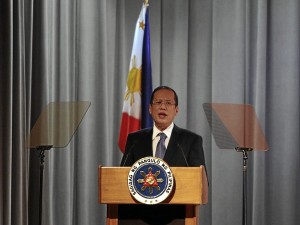
ANNOUNCING GOOD NEWS. No less than President Benigno Aquino III announced on Thursday (Manila time) the good news to a large group of Filipino well-wishers in Washington, DC, during his working visit to the US that the Philippine government posted a budget surplus of P9.22 billion in August. INQUIRER photo
With growing revenue and curtailed spending, the government was able to post a budget surplus of P9.22 billion in August.
As a result, the budget deficit in the eight months to August reached P34.49 billion—about a seventh of the P228.1 billion recorded in the same period of 2010.
With four months to go before the year ends, Malacañang has disbursed a mere 12 percent of the P300 billion it plans to spend in 2011, on top of the national budget.
From January to August, expenses reached P947.2 billion, or 8 percent less than the P1.03 trillion reported in the same period last year.
Eight-month revenue also amounted to P912.8 billion, or 13.7 percent higher than last year’s P802.8 billion.
In August alone, expenditures reached P114.9 billion, 7.9 percent more than the P106.5 billion spent in the same month of 2010.
That same month, revenue came in at P124.1 billion—an increase of 15.2 percent from last year’s P107.8 billion.
According to President Aquino, the P9-billion budget surplus was indicative not of underspending, for which his administration had drawn flak, but of a genuine rise in revenue.
The President announced “the good news” to members of the Filipino community who gathered at the United States Capitol on Thursday (Manila time) to hear him speak.
“I want to report that this … morning, our Finance Secretary Cesar Purisima told me, ‘Sir, we have good news.’ I told [Purisima] to make it public,” the President said in Filipino.
The President was wrapping up a whirlwind visit to New York and Washington when he addressed the large group of Filipino well-wishers.
The announcement drew a round of applause from a crowd that drove up from neighboring states to be with the President at the main ballroom of the Fairfax at Embassy Row Hotel on Massachusetts Avenue in Washington, DC.
“I thought it was really good news,” said Fe Nieves-Khouw, president of the Philippine Nurses Association (PNA)-Maryland chapter.
“It is a step in the right direction. Maybe, what is really happening is [the government] is really trying [to rid the country of] corruption and [making] concrete plans to improve the Philippines. Maybe now, the right people are on board,” Nieves-Khouw said.
Sought for comment, Budget Secretary Florencio Abad told the Inquirer that the main factor behind the surplus was additional revenue collection.
The January-to-August expenditure “is bigger than that of the same period in 2010,” said the budget chief. “So we are continually spending well. But in this instance the increase in revenue is greater than the decrease in the improvements in spending.”
He credited the government’s sincerity in going after tax evaders and smugglers as the reason for the sudden jump in tax collection.
From January to August, Customs chipped in P172 billion, up from P170.7 billion last year.
The Bureau of Internal Revenue contributed P619.7 billion, up by 13.4 percent from year-ago collections of P546.4 billion.
Also, the Bureau of the Treasury turned in P62.1 billion, which was 59 percent more than the P39 billion earned previously.
Other government offices yielded P58.9 billion, rising by 26.4 percent year on year from P46.6 billion.
In a statement, University of the Philippines economics professor Benjamin E. Diokno said BIR collections appeared to be on track, but it would be Customs that would face formidable odds to meet its full-year revenue target.
“Right now I estimate that for the first three quarters, [the BoC] would be behind by around P36.1 billion,” Diokno said. “The new leadership at BoC will face three challenges—the slowing trade, falling oil prices, and appreciating peso.”
In a separate statement, Purisima said Customs collections are expected “to pick up, especially at the onset of the holiday season.
Hopefully, Purisima said, this would be enough to offset negative factors.
But according to Diokno, the government continues to underspend amid “a slower, harsher, and riskier” world economy.
“I estimate that, for the first three quarters of the year, the Aquino administration has failed to move some P179.2 billion out of a programmed budget of P1.023.6 trillion (net of interest payments), or by 17.5 percent,” Diokno said.
The former budget secretary said the unspent amount could have created a lot of jobs and could have brought benefits to the people and the economy much sooner than when these projects would finally be implemented, which he said would be probably next year.